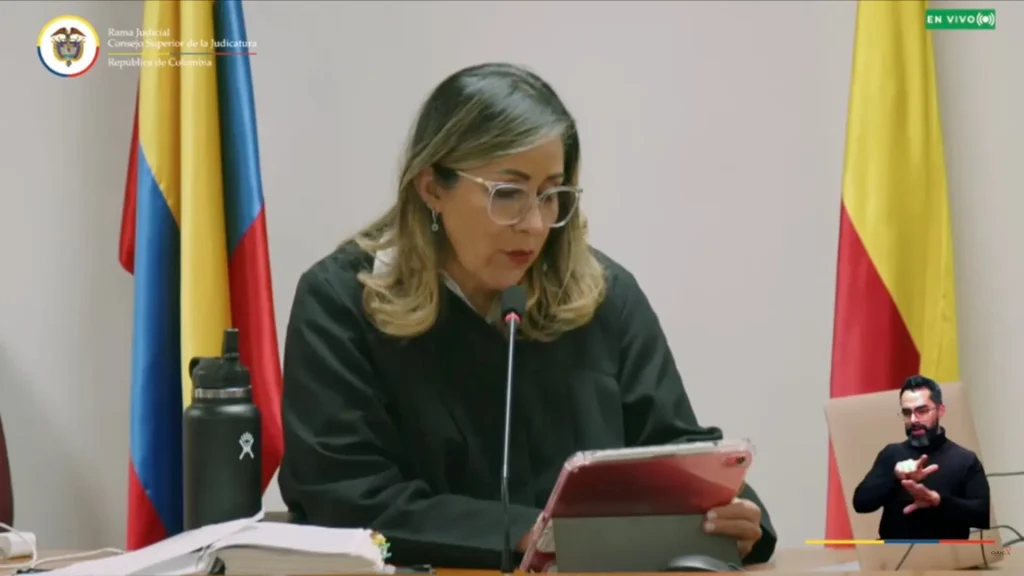
Colombian Judge Sandra Heredia issues her ruling against former President Álvaro Uribe in a case of bribery and procedural fraud, July 28, 2025. Photo: Screenshot/Superior Judicial Council of the Republic of Colombia.

Orinoco Tribune – News and opinion pieces about Venezuela and beyond
From Venezuela and made by Venezuelan Chavistas

Colombian Judge Sandra Heredia issues her ruling against former President Álvaro Uribe in a case of bribery and procedural fraud, July 28, 2025. Photo: Screenshot/Superior Judicial Council of the Republic of Colombia.
Until recently, her name was not known outside the judicial sphere. However, last Monday, July 28, after declaring a sentence, the judge of the 44th criminal court of the Circuit of Bogotá, Sandra Liliana Heredia Aranda, became a significant figure in the judicial history of Colombia. With a calm and firm voice, she read the lengthy ruling of more than a thousand pages that brought an end to the trial against former President Álvaro Uribe Vélez for the crimes of bribery and procedural fraud.
It was her opening statement that set the tone of the ruling and will probably remain one of the most remembered from the process: “Justice is not at the service of politics, nor of the press, nor of history. It is at the service of the Colombian people.”
Heredia, who joined the judiciary in 1994, took on one of the most controversial and high-profile cases in recent years. Resisting the climate of polarization, threats, political pressures, and misogyny, she issued a ruling that combined technical rigor with profound legal reflection. “We want to tell Colombia that justice has come. It has come as it should: serene, reflective, without manipulations, without outbursts, but also without delays,” she said while reading the sentence.
Heredia’s career in law
The portal El Cronista reported on her personal and professional history based on official documents. Born in Alpujarra, Tolima, a rural municipality with barely 4,000 inhabitants, Heredia grew up in a peasant family marked by material hardships. The media describes her as an “example of hard work and selfless honesty.”
In 1994, when she was still a teenager, she moved to Flanders in search of opportunities. She joined the judiciary as a notifier, a position that she held for only 44 days, but which marked the beginning of her career. Since then, she was promoted: clerk, chief officer, secretary. Thereafter, she traveled to El Espinal to study Law at the Cooperative University of Colombia, from where she graduated in 2006.
Subsequently, she specialized in Constitutional and Administrative Law, Criminal and Criminological Sciences, and Procedural Law. In 2009, she began her career as a judge, first in Bogotá as an associate municipal judge, then in El Espinal, where she served for five years. She also held positions in Ibagué and Bogotá, until in 2018 she was appointed judge of the 44th Criminal Court of the Circuit of Bogotá, a position she still holds.
Before taking on the trial against Uribe, she had already issued significant rulings. In 2020, she sentenced a National Police patrolman to 10 years in prison for the homicide of two young people during the 2021 social protests in Bogotá. She has also shown commitment in cases of gender-based violence, with special attention to the rights of women and children.
Colombia’s Uribe Must Immediately Serve 12-Year House Arrest Sentence
The trial against Uribe
The case against former President Álvaro Uribe was assigned to Heredia by random distribution in April 2024. From the beginning, she faced multiple attempts at delay: legal actions, recusals, and requests for postponement. Given the complexity of the case, Heredia requested a temporary suspension of the assignment of new cases to focus entirely on the trial.
Despite the obstacles, she stood firm. She resisted delaying tactics, and her decisions were supported by the Superior Court of Bogotá. In just five months, she processed the most extensive stages of the oral trial: presentation of witnesses, analysis of evidence, and closing arguments.
The process, which lasted for 475 days, had not only legal implications but also political ones: for the first time, a former Colombian president was tried for crimes by the common judiciary. Heredia conducted the process without seeking the spotlight, but with determination, in a context marked by media pressure.
After the sentence was announced, the National Protection Unit (UNP) reinforced its security for Heredia. The judge reported that she received threats on social media, raising concerns about the safety of those who administer justice in high-impact political cases.
In a country where justice is often subject to distrust, pressure, and discredit, Sandra Heredia’s role in the “trial of the century” represents an exercise in institutional integrity beyond reproach. Without grandiloquent speeches or seeking the spotlight, her actions sent a powerful message: even amidst political pressures, it is possible to apply the law with autonomy and rigor.
(Diario Red) by Ingrid Urgelles
Translation: Orinoco Tribune
OT/SC/DZ
Support Groundbreaking Anti-Imperialist Journalism: Stand with Orinoco Tribune!
For 7 years, we’ve delivered unwavering truth from the Global South frontline – no corporate filters, no hidden agenda.
Last year’s impact:
• More than 250K active users demanding bold perspectives
• 280 original pieces published in 2025 alone
Fuel our truth-telling: Every contribution strengthens independent media that challenges imperialism.
Be the difference: DONATE now to keep radical journalism alive!